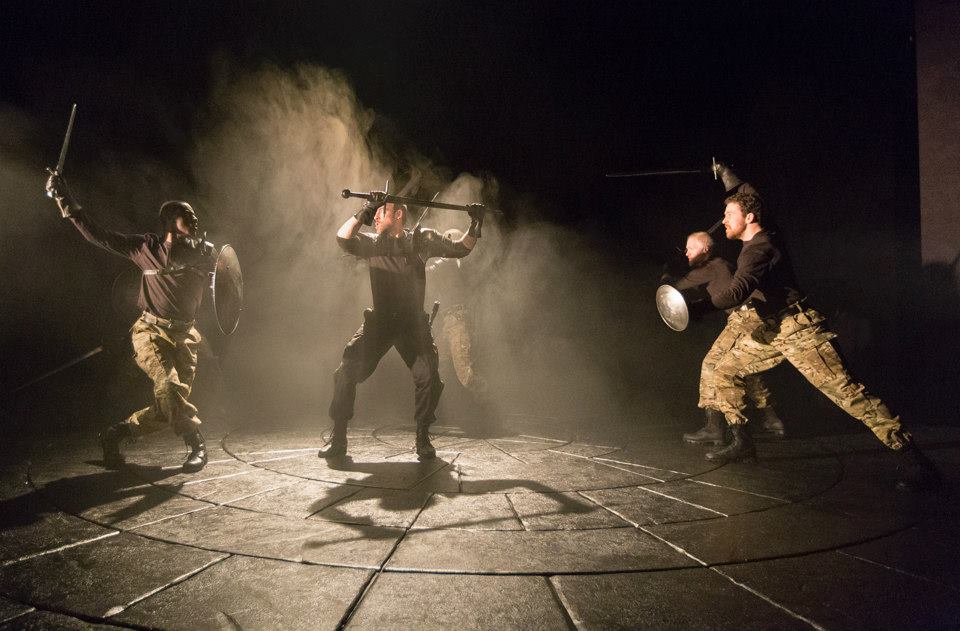Note: This review is part of a new feature section on Phindie: Critical Mass. Each week during the play’s run, a reviewer from this publication will return to the Arden to reconsider the work and respond to previous critical takes. Read more about this here.

As this is the fourth installment of a multi-part review, far too many words have already been spilled about what is essentially an unremarkable piece of theater. Alexander Burns’s take on MACBETH at the Arden Theatre Company shoots for spectacle at every opportunity, but pretty much fails at delivering character on all possible points.
The production leads us in with a sword fight. The first thing we see—clashing swords, swirling bodies, Macbeth (Ian Merrill Peakes) beheading a dead man—foreshadows both the well-known conclusion of Shakespeare’s shortest play and the director’s strategy in getting us to sit through it.
Shakespeare wrote for nearly bare stages. His plays, presented in the round, provide language to establish pretty much everything except for some action between the characters. Scenery, crowds, battles, floating ghostly hands, night time, specters—these are generally described in depth, since there was almost no way to show them without blocking off the actors.
Today we have more choices, and Burns, whose style leans towards cinematic slickness, action, and fast transitions, has made the decision never to take Shakespeare’s route. Whenever a thing is mentioned, he shows it, squeezing as much interest out of it as possible. Thus the battle at the start, thus Macbeth dragging his wife’s corpse back on after her death, thus adding a coronation scene.
This is all fine. If you have the funding, and you have good ideas, show, don’t tell. The problem is that, up against this spectacle is propped the swiftly-cooling body of a play whose characters have barely been explored. Burns’s actors, stiff-backed and stiff-legged, slog through the long, dreary monologues which droop between the action. The audience looks on in puzzlement, desperately wanting some real content to ground them and tell them what’s happening.
In Lady Macbeth’s (Judith Lightfoot Clarke) first scene, she receives a letter from Macbeth telling her that three witches have told him he’s going to become king. This is a major moment in the woman’s life. Moments later, she decides that she will be queen and resolves to kill Duncan, king of Scotland, if necessary. This speech, like many others in the play, is simply delivered, not acted. Clarke gives us no clue what is going on between the lines, just says the words and bends at the knees a bit, I suppose to show excitement. Her Lady Macbeth, we must presume, is evil from the start, and always thought she would be queen. Or maybe she’s read the letter a bunch of times and it no longer affects her. Which is as uninteresting and uninspired a choice as anyone could make.
The conclusion we’re forced to draw is that this is a production that loves the trappings—the lighting, the fighting, the murder and severed heads—but despises Shakespeare’s play and characters, and wants nothing to do with them.[Arden Theatre Company F. Otto Haas Stage, 40 N Second Street] March 5-April 19, 2015; ardentheatre.org.
Reviews of MACBETH:
- Critical Mass 1, Christopher Munden, Phindie.com: “exuberant—though perhaps shallow“
- Critical Mass 2, Ninni Saajola, Phindie.com: “energetic and visually engaging, but lacks ferocity and substance“
- Critical Mass 3: Jessica Foley, Phindie.com: “we feel nothing because the actors the feel nothing“
- Neal Zoren, NealsPaper.com: “creditable production never finds a launching point“
- Toby Zinman, Philly.com: “A riveting new production“
- Howard Shapiro, NewsWorks.org: “unusual, starting with the editing“
- Christina Perryman, DelcoNewsNetwork.com: “well-acted and moving study of Macbeth’s rise and fall“
- David Anthony Fox, CityPaper.net: “honorable but tame production“
- Jessica Foley’s unedited review on FoleyGotComped.blogspot.com
- Tim Dunleavy, TalkingBroadway.com “depth, anchored by rich, nuanced performances“
- Kelli Curtin, TheatreSensation.com: “delivers an exceptional evening of theater“
- Steve Cohen, BroadStreetReview.com: “a straightforward telling of the story“
- Judy Cohen, Beyond My Backyard: “one of the smash hits of the season“
